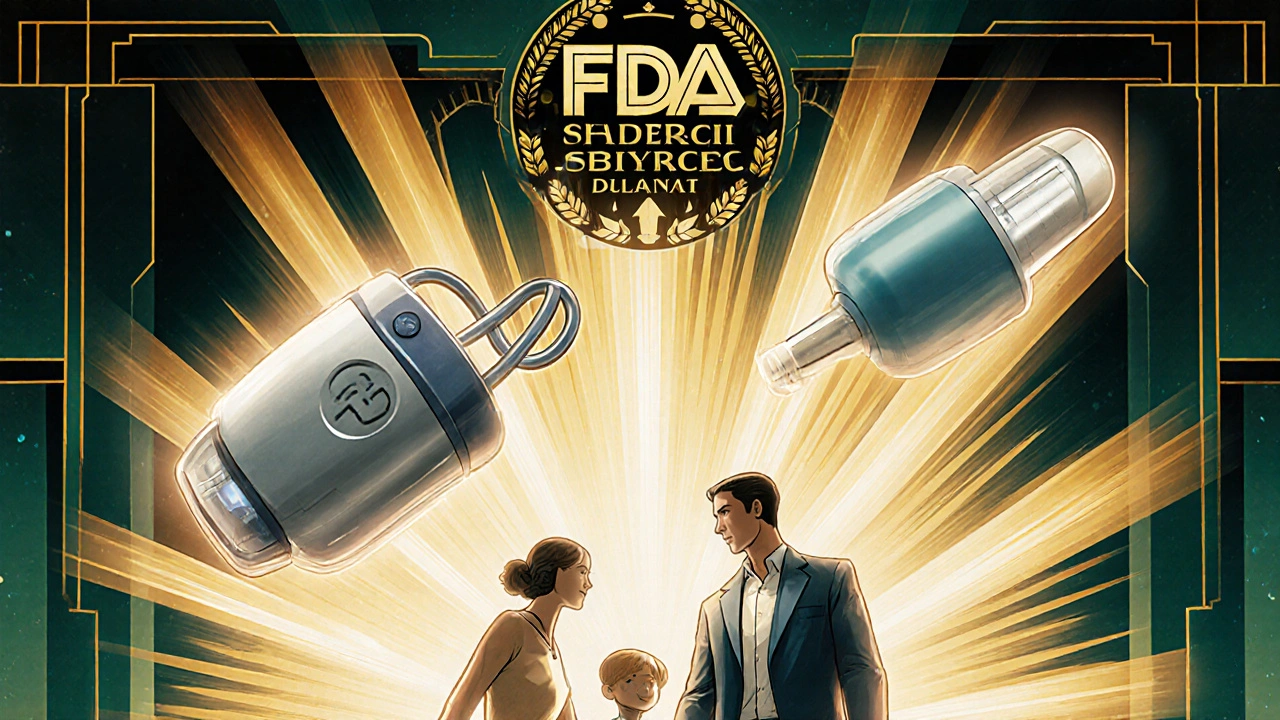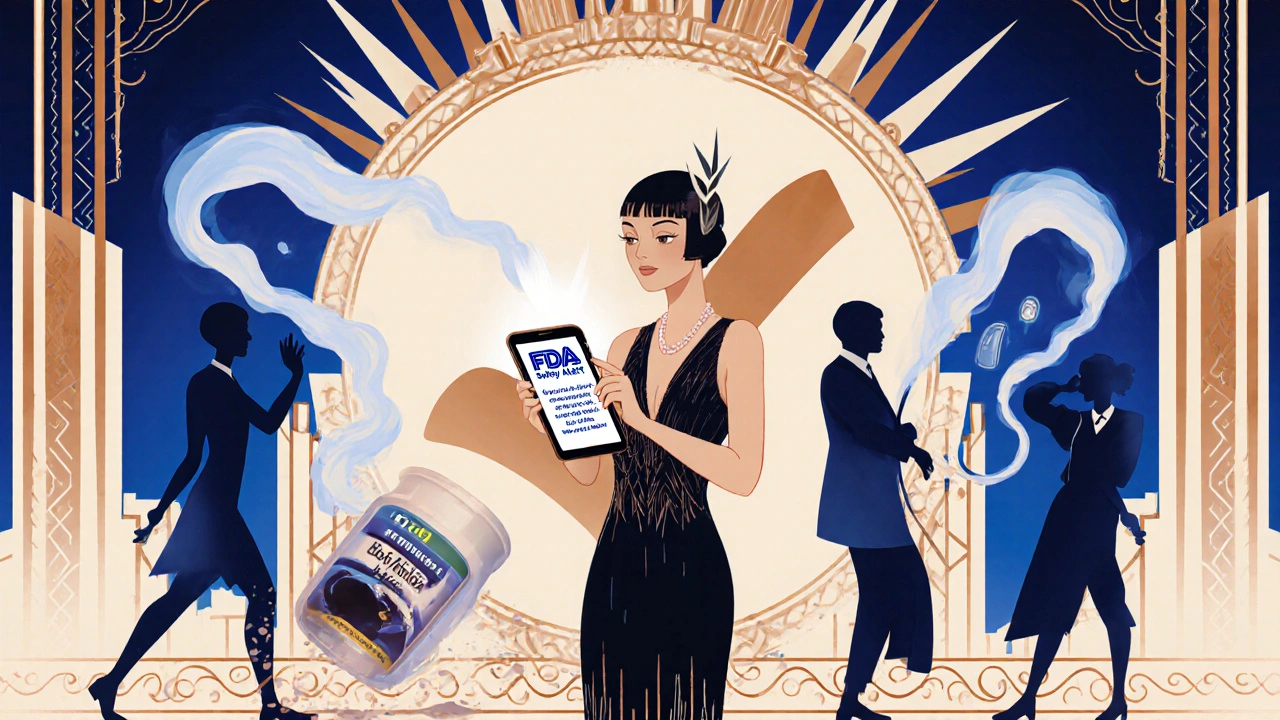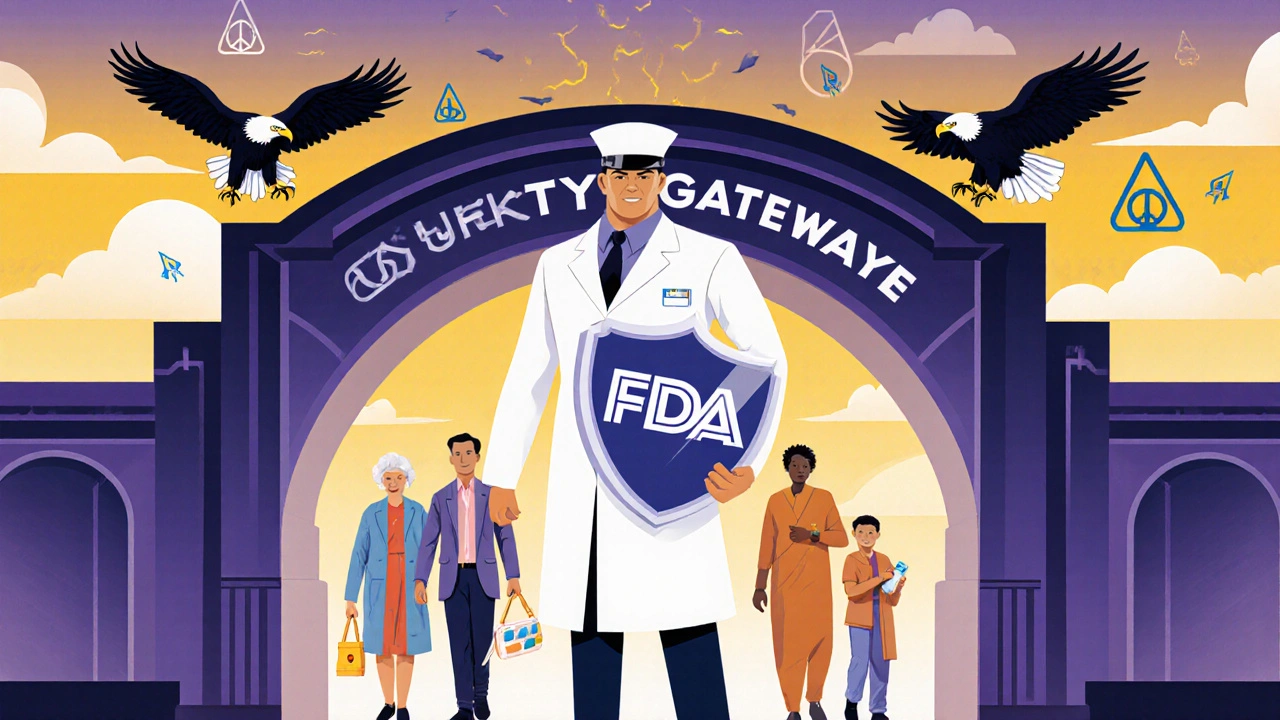Subscribe to FDA Safety Communications: Never Miss a Critical Alert
 Oct, 28 2025
Oct, 28 2025
FDA Safety Alert Keyword Finder
Find Your Perfect Keywords
Select your situation to get relevant keyword suggestions for FDA Safety Communications subscriptions. These keywords will help you receive alerts about products that matter most to you.
Your Situation
Keyword Suggestions
Click to select relevant keywords for your situation
Your Selected Keywords
No keywords selected yet. Click on suggestions above to add relevant keywords for your subscription.
💡 Tip: You can add multiple keywords to get more targeted alerts. For example, if you use a specific insulin pump model, include both "insulin" and "Medtronic" as keywords.
Imagine you or someone you love is using a medical device-maybe a pacemaker, an insulin pump, or a joint replacement-and suddenly, a hidden flaw is discovered. The manufacturer doesn’t know yet. The doctor hasn’t been told. But the FDA does. And if you’re not subscribed, you won’t hear about it until it’s too late.
The U.S. Food and Drug Administration (FDA) sends out urgent safety alerts every day. Not every day. But enough to matter. In 2022 alone, the FDA’s Center for Devices and Radiological Health issued 45 safety communications about medical devices. That’s not counting drug recalls, food warnings, or vaccine updates. These aren’t newsletters. These are lifelines.
What Are FDA Safety Communications?
FDA Safety Communications are official alerts about risks tied to products the FDA regulates: medicines, medical devices, vaccines, food, cosmetics, and tobacco. They’re not press releases. They’re not marketing. They’re direct, actionable warnings-often issued before a product is officially recalled.
These alerts come in different forms:
- Medical Device Safety Communications: These warn about defects, malfunctions, or deaths linked to devices like ventilators, infusion pumps, or hip implants.
- Drug Safety Communications: These flag new side effects, dangerous interactions, or manufacturing issues with prescription or over-the-counter drugs.
- Enforcement Reports: These list recalls-products pulled from shelves because they’re unsafe, mislabeled, or contaminated.
- Early Alert Communications: Launched in 2024 and expanded to cover all medical devices on September 29, 2025, these are the most urgent. They’re sent when the FDA learns of a serious problem but hasn’t yet confirmed it meets the legal definition of a recall. This cuts days-or even weeks-off the response time.
Each alert includes: what the issue is, which products are affected, who’s at risk, and most importantly-what to do. No jargon. No fluff. Just clear steps: stop using it. Contact your doctor. Return it. Monitor for symptoms.
Why Subscribing Isn’t Optional
You might think, “I don’t use medical devices. I don’t take risky drugs. This doesn’t apply to me.” But here’s the truth: you’re probably already using something regulated by the FDA.
Maybe it’s your daily multivitamin. Or your glucose monitor. Or the hand sanitizer you bought last winter. Or the baby formula your child drinks. Or the over-the-counter painkiller you take for headaches.
In 2022, the FDA issued 17 food safety alerts. One involved peanut contamination. Another, a batch of infant formula with harmful bacteria. These aren’t rare. They happen regularly. And if you’re not signed up, you’ll find out about them from a friend, a news headline, or worse-after someone you know gets sick.
For patients with chronic conditions, these alerts can be life-saving. A diabetic who gets an alert about a faulty insulin pump can switch to a backup before it fails. A cancer patient whose chemo drug has a new interaction warning can ask their oncologist to adjust their regimen. A parent whose child uses a breathing device can learn about a faulty valve before it causes harm.
It’s not just about personal safety. For caregivers, nurses, pharmacists, and doctors, these alerts are part of daily clinical decision-making. Ignoring them isn’t negligence-it’s dangerous.
How to Subscribe (It Takes Less Than 2 Minutes)
Signing up is free. Simple. And it only takes a few clicks.
Go to fda.gov and search for “Subscribe to FDA Safety Communications.” You’ll see two main options:
- Enforcement Report Subscription Service: This covers recalls across all FDA-regulated products-drugs, devices, food, cosmetics. You can choose up to five custom keywords. Want alerts only for “peanut”? Type it in. Only “insulin”? Done. “Glucose monitor”? Added. You’ll get emails only when those exact terms appear in a recall notice. No spam. No noise.
- Medical Device Safety and Recalls: This is the go-to for anyone using or managing medical devices. It includes all Safety Communications, recalls, and now-since September 29, 2025-every Early Alert for any medical device, no matter the type.
That’s it. Enter your email. Confirm your subscription. Done.
You’ll start getting emails within 24 to 48 hours of new alerts. Some weeks, none. Other weeks, three or four. But when one comes, it’s urgent. And you’ll be the first to know.

What You Won’t Get (And What You Should Know)
Some people expect the FDA to notify them about every minor issue. That’s not how it works. These alerts are for significant safety concerns-ones that could cause serious injury or death.
Also, the system doesn’t know your personal health history. It doesn’t know you have a peanut allergy unless you type “peanut” as a keyword. It doesn’t know you’re on blood thinners unless you search for “warfarin.” You have to be specific.
And while Early Alerts are faster than recalls, they’re not official. They’re warnings. The FDA says: “We believe this issue may be serious. You should take action.” But they haven’t yet forced a recall. That’s why you need to act quickly when you see one.
Who Should Subscribe?
Everyone. But here’s who benefits the most:
- Patients with chronic conditions: Diabetes, heart disease, epilepsy, cancer-anyone relying on devices or daily meds.
- Parents of young children: Formula, vaccines, baby monitors, cribs-all FDA-regulated.
- Seniors: Hearing aids, pacemakers, blood pressure monitors, joint replacements.
- Healthcare providers: Doctors, nurses, pharmacists-they need this to make safe decisions.
- Medical device manufacturers and suppliers: It’s not just about compliance. It’s about protecting your reputation and avoiding lawsuits.
- Anyone who shops online: You might buy a fitness tracker, a TENS unit, or a weight-loss supplement. All of these are FDA-regulated.
There’s no downside. No cost. No obligation. Just peace of mind.

The Bigger Picture: Why This Matters
The FDA doesn’t test every product before it hits the market. It can’t. That’s why postmarket surveillance-the monitoring of products after they’re sold-is critical. The FDA uses data from hospitals, patient reports, and labs to spot patterns. When something shows up repeatedly-like a certain pump failing or a drug causing unexpected liver damage-they act.
That’s where Safety Communications come in. They turn raw data into real-world action. They bridge the gap between science and safety.
And now, with the September 2025 expansion of Early Alerts to cover every medical device, the system is more complete than ever. No more blind spots. No more waiting. If a device poses a serious risk, you’ll know before it’s too late.
This isn’t bureaucracy. It’s protection. And it’s free.
What Happens If You Don’t Subscribe?
You’ll still hear about recalls. Eventually. Maybe from a news alert. Or a call from your pharmacy. Or a friend’s Facebook post.
But by then, the damage might already be done.
One woman in Ohio didn’t know her insulin pump had been recalled. She kept using it. Three weeks later, she went into diabetic ketoacidosis. She survived. But she spent two weeks in the hospital.
A man in Texas didn’t realize his knee implant was part of a safety alert. He ignored it. A year later, the implant fractured. He needed a second surgery.
These aren’t rare stories. They happen every month.
Subscribing isn’t about being paranoid. It’s about being informed.
How often do FDA Safety Communications come out?
There’s no fixed schedule. Alerts come out whenever a serious safety issue is confirmed. Some weeks, none. Other weeks, multiple. In 2022, the FDA issued over 45 medical device alerts alone. If you’re subscribed to relevant keywords, you’ll get notified the same day the alert is posted.
Can I unsubscribe later?
Yes. Every email from the FDA includes an unsubscribe link at the bottom. You can turn off alerts for specific keywords or cancel the entire subscription at any time. But once you’ve experienced how useful they are, most people keep them on.
Are these alerts only for people in the U.S.?
Yes. The FDA only regulates products sold or used in the United States. If you live outside the U.S., you won’t receive these alerts. But many countries have their own regulatory agencies-like Health Canada or the EMA in Europe-that offer similar services. Check your local health authority’s website.
What if I don’t know what keywords to choose?
Start with the basics: your condition (e.g., “diabetes,” “hypertension”), the name of your device or drug (e.g., “Medtronic insulin pump,” “Lipitor”), or common allergens (e.g., “peanut,” “shellfish”). You can always add or remove keywords later. The system lets you manage your preferences anytime.
Do I need to pay for this service?
No. The FDA’s subscription service is completely free. No hidden fees. No upsells. No ads. It’s a public health tool funded by taxpayer dollars to protect you.
What’s the difference between an Early Alert and a recall?
An Early Alert is a warning issued before a formal recall is required. The FDA has reason to believe a product may be dangerous, but hasn’t yet confirmed it meets the legal definition of a recall. A recall is a formal action-meaning the FDA has determined the product violates regulations and must be removed. Early Alerts are faster. Recalls are more official. Both require action.
Can I get alerts for food and supplements too?
Yes. The Enforcement Report Subscription Service covers food, dietary supplements, cosmetics, and tobacco products. Just add keywords like “listeria,” “vitamin D,” or “tanning bed” to get alerts for those categories.
What if I miss an email? Can I check past alerts?
Absolutely. All past Safety Communications, recalls, and Early Alerts are archived on the FDA website. Visit fda.gov/safety/notices to browse by date, product type, or keyword. You can even sign up for a weekly digest of all new notices.
Next Steps: What to Do Right Now
Don’t wait for something to go wrong.
Open your browser. Go to fda.gov. Search for “Subscribe to FDA Safety Communications.” Pick the option that matches your needs-either the Enforcement Report service or the Medical Device Safety list. Add your email. Choose your keywords. Hit submit.
Then, tell someone you care about. A parent. A sibling. A friend with a chronic illness. Send them this link. Because safety isn’t just personal. It’s shared.
Kat Sal
October 29, 2025 AT 06:05I signed up for the medical device alerts after my mom’s pacemaker had that glitch last year. Got the email within hours - saved her from a hospital trip. Seriously, if you use anything that plugs in or pumps meds, just do it. It’s free. It’s easy. And it’s literally a lifeline.
Also, I added ‘insulin pump’ and ‘glucose monitor’ as keywords. Best two minutes of my life.
Rebecca Breslin
October 30, 2025 AT 13:12Okay but let’s be real - the FDA doesn’t even know what half these devices do. I work in medtech. They rely on hospital reports that take months to file. Early Alerts are a start, but they’re still playing catch-up. The real problem? Manufacturers bury defects until the FDA forces them to act. And that’s too late for a lot of people.
Also, why is there no API for this? Why do I have to check my email? I want this in my EHR.
Kierstead January
October 31, 2025 AT 20:59People act like this is some revolutionary public service. Newsflash: the FDA is a bloated bureaucracy that approves junk like OTC weight-loss gummies and then scrambles to pull them later. You think subscribing to their alerts makes you smart? You’re just trusting a system that let melatonin gummies with lead contamination hit the market last year.
Meanwhile, my cousin in Germany gets alerts from the EMA that are faster and clearer. We’re not special. We’re just late to the party.
Imogen Levermore
November 1, 2025 AT 16:08subscribe?? 😳 but… what if this is how they track you?? like… what if your email gets linked to your medical records and then sold to Big Pharma?? 🤔 i read on a forum that the FDA has a secret contract with Google to predict ‘high-risk patients’… and now they want you to VOLUNTARILY give them your info?? 🤯
also… why do they spell ‘recalls’ with two L’s? suspicious.
ps: i unsubscribed after my last alert said ‘peanut’ and i’m allergic to… air? 🌬️
Chris Dockter
November 1, 2025 AT 20:14Gordon Oluoch
November 3, 2025 AT 17:24Let’s not romanticize this. The FDA is not your friend. It’s a regulatory body with limited resources and political pressure. The fact that you’re grateful for a free email service means you’ve accepted the collapse of proactive healthcare oversight. You’re not being protected - you’re being given scraps after the system failed.
And yes, I know you think this is ‘peace of mind.’ It’s just delayed trauma with a subscription box.
Tyler Wolfe
November 4, 2025 AT 22:10Just signed up for the Enforcement Report with ‘peanut’ and ‘infant formula’ as keywords. My daughter’s 11 months old. I don’t want to be the parent who finds out about a recall from a Facebook post.
Also, I added ‘TENS unit’ - I use one for back pain. Didn’t even realize it was regulated. Crazy how much of our daily life is covered by this.
Thanks for the nudge. I’ll pass this along to my mom too.
Neil Mason
November 6, 2025 AT 16:10As a Canadian, I have to say - I wish Health Canada had something this clear. Their alerts are buried under 12 layers of PDFs and government jargon. The FDA’s system is actually decent. Simple. Direct. No fluff.
I told my sister in Ottawa to check out the EMA’s version - she’s on blood thinners. She’s now subscribed to both. We’re all just trying not to die from a faulty device or contaminated supplement.
Also, I added ‘warfarin’ as a keyword. Been using it for 8 years. Never knew I could get alerts for it. Mind blown.
Andrea Gracis
November 7, 2025 AT 23:45i just subscribed!! i had no idea this was a thing. i use a glucose monitor and take metformin. i added those as keywords. also ‘peanut’ bc my kid is allergic. i feel so much better now. thank you for sharing this!!
ps: i think i spelled ‘subscribe’ wrong in the form but it worked?? lol
Matthew Wilson Thorne
November 9, 2025 AT 19:06Subscribing is a performative act of compliance. The real solution is systemic reform - not email notifications. But I’ll do it anyway. Because why not?
April Liu
November 10, 2025 AT 05:11Just got my first alert today - a TENS unit recall. I’ve had mine for two years. I called my doctor immediately. They said they’d never heard of it either. 😳
Thank you for posting this. I’m sharing it with my book club. My aunt’s on dialysis. She needs to know. You’re doing good work here. 💪❤️
Emily Gibson
November 11, 2025 AT 08:20My dad’s a retired nurse. He told me about this last week. I thought he was being dramatic. Then I remembered he used to write recalls on sticky notes and put them on the fridge. I subscribed today. Added ‘pacemaker’, ‘blood thinner’, and ‘hearing aid’. He’s 78. I want him to be safe.
Thanks for reminding me that small actions matter. I’m telling my coworkers tomorrow.